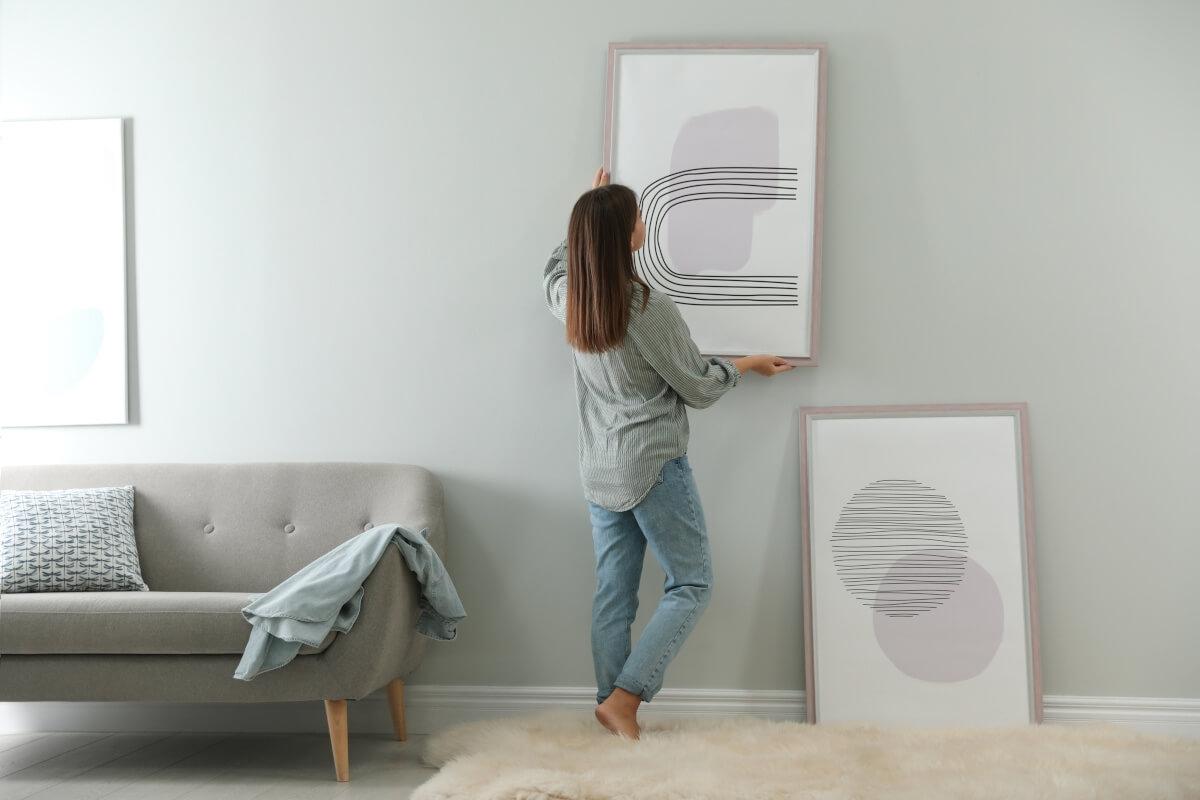Renting your first apartment is a big deal. You’re on your own (or with a roommate) and can do what you want whenever you want. It also means paying for bills you’re not used to paying, and that can be jarring.
Make your first apartment living experience a great one. Follow these first-time renter tips to navigate the rental process and enjoy your new home!
1. Budget Wisely

Putting together an apartment budget can help you save up for your first apartment. Budgeting before and after you move in is a great way to grow your savings for rent, utilities, home décor, and more.
Most financial advisers suggest spending no more than 30% of your pre-tax income on rent. Our rent affordability calculator can help you pinpoint a good budget for a rental based on your monthly income.
The 50/30/20 rule is another good framework to follow. The 50/30/20 rule suggests that 50% of your income should go toward essential living expenses like rent, groceries, and transportation, 30% should go toward non-essential expenses like vacations, hobbies, and streaming services, and 20% should go toward savings and retirement. Following the 50/30/20 rule is a good way to ensure you’re on the right track.
Remember to include all your monthly expenses and make room for unexpected costs when creating a budget. If your budget is tight, renting with a roommate will allow you to split your bills, helping you save money and stay within your budget.
2. Determine Your Needs
Before you start scouting for apartments, make a checklist for your needs. If you own a car, you’ll need a rental with parking space. Pet owners will need to find a pet-friendly community that’s accommodating to their furry friends. If furniture isn’t in your budget, you might consider a furnished apartment.
Your apartment needs are very different from your apartment wants. They’re your must-haves, the features that will make you the most comfortable at home. Amenities like a swimming pool or a balcony are typically wants, while air conditioning and a dishwasher are probably needs. Determine what your needs are first, and then be elated when your apartment comes with some of your apartment wants.
3. Take a Walking Tour of the Apartment
Virtual apartment tours have made it simple for renters to view new homes from afar. However, a good old-fashioned in-person tour can help you experience the area first-hand. Schedule a tour with an apartment community so you can get a sense of the layout, the community, and how amenities are kept on a daily basis, from the trash collection area to the fitness center.
Ask questions when you’re on a tour with the property manager. Is parking assigned or first-come, first-serve? How do residents receive mail? When are the community quiet hours? Be sure to come up with a list of questions based on what’s important to you.
4. Know What Utilities are Included

Some apartments may come with included utilities and others will not. If included utilities are important to you, add it into your search and adjust your budget accordingly.
Talk with your property manager about the utilities that will be added to each rent payment. For example, some communities bill their tenants directly for water usage instead of making tenants open an account with the city. If this is the case, you’ll add on the amount owed to each rent payment rather than send your payment to the local water department.
If utilities are not included in your rent, you’ll likely have to set up new accounts with utility providers. One-time initiation fees are common when setting up your utilities, so make sure you factor these fees into your budget.
5. Consider the Parking Situation for You and Guests
Parking can sometimes be a hassle when you live in an urban area. Garages that fill up quickly and limited space for guests can be overwhelming if you don’t do your due diligence. Many apartment communities have parking rules for residents and their guests that may be enforced with parking tickets or towing.
Before you sign the lease to a new apartment, speak with the property manager about the parking situation so you know how to plan for yourself and for your friends. Here are some questions to consider asking:
- How full does the parking lot get in the evenings?
- Where do visitors park their cars?
- If I have an overnight guest, will I need to get them a visitor’s pass for their vehicle?
- Will I have my own assigned spot in the garage?
- Is parking free, or is there a monthly fee?
6. Know What the Application Process Involves
Renting an apartment for the very first time can be confusing. First-time renters may not know what the application process involves or understand the jargon and rental lingo used in an application.
The application process is pretty simple. It typically involves filling out an application, a credit check, and paying a small application fee. The turnaround time for approval is quick—you’ll typically know in one to three business days if you’ve been approved for a rental.
New renters with no credit may need a guarantor to be approved for a rental. A guarantor is someone who signs your lease with you and is legally responsible for paying your rent if you miss a payment. A guarantor will undergo a credit check, so you’ll want someone who you trust and who has a good credit history.
7. Read and Understand the Lease

Signing a lease can be equal parts exciting and nerve-wracking. But while you may not be able to contain your feelings, don’t ever feel rushed into signing a lease.
Read the contract in its entirety and note the concerns that you see. If you and the property manager agreed to something during the tour, make sure it is written into the agreement. If it’s not written in the lease agreement, they may not be legally required to hold up their end of the deal.
Understanding your lease through legal jargon can be hard, but it can save you trouble in the long run. Keep a copy of your lease in a safe place in case you need to reference something like when rent is due, what late fees are, the pet policy, and how to submit a maintenance request, among other things.
If it feels like a property manager is rushing you into signing a lease, that may be a red flag. Unfortunately, rental scams are all too common and specifically prey on first-time renters. Honest property managers want tenants who have read the lease and understand what’s expected of them, so if a landlord is pressuring you to sign without reading the fine print, you may be better off elsewhere.
8. Get Renters Insurance
Most property managers require you to purchase renters insurance before you move in, which protects both you and the property manager. A renters insurance policy provides monetary protection for you and your belongings in case of emergencies like fires or theft. Renters insurance includes property coverage, personal liability coverage, and temporary housing if your rental has been deemed inhabitable.
According to Experian, renters insurance costs an average of $14 a month, or $166 a year. For the monetary protection and peace of mind renters insurance provides, the cost is worth it. Some property managers may have a preferred insurance agency, but you can also shop around and get quotes from different agencies to make sure you’re getting the best deal. Read through your lease to make sure your renters insurance meets any minimum coverage requirements.
9. Walk Through the Apartment
Once you have the apartment keys, your property manager will do a walk-through with you. This will allow you to look through the home and take note of any issues you see, such as scratches on the walls or low water pressure in the shower. After you’ve done the walk-through, you or your property manager will send a list of repairs to maintenance for them to fix.
If you don’t do a walk-through with your property manager and record damages, you could be responsible for paying for the repairs at the end of your lease. Make sure you take plenty of pictures of your rental during your walk-through, so you don’t get charged for damages that aren’t your fault!
10. Befriend Your Neighbors
Befriending your neighbors is an excellent way to get the most out of your first apartment. Getting to know your neighbors can open up the lines of communication about having friends over later into the evening, so you can inform them about noise ahead of time and avoid a passive-aggressive note on your door. You’ll be more comfortable asking for neighborly favors, such as getting the mail when you’re out of town or taking your dog for a walk when you need to stay late at work. Make sure you can return the favor, too!
11. Decorate Intentionally

Once you move in, you can get to decorating your new home!
Because you don’t own your rental, you can’t make permanent changes. Most rentals allow you to hang pictures on the walls, but you typically can’t make structural changes like painting the walls or changing the flooring. Check your lease before you start decorating so you know what you can and can’t do.
You can still make your rental feel like home even when you can’t make permanent changes. Bring your walls to life with art that fits your style, and light up your new home with fun lamps. Curtains can make a room look more expensive, and throw blankets and pillows are a great way to add pops of color. If you’re on a tight budget, don’t stress! There are plenty of ways to decorate your home on a budget.
Renting your first apartment can be daunting, but it’s a great experience. You’ll get the hang of the additional responsibilities with time, and you can always talk to your property manager about any questions or concerns. After you move in, you can get to hosting your friends and making your new place feel like home.
This article was originally published on July 7, 2019, by Lauren Ross.
FAQs
Can I rent with a bad credit score?
Yes, you can rent with a bad credit score or no credit history, but it’ll be a little harder. Because a credit score helps property managers assess the likelihood of you paying rent on time, a bad credit score or no credit history leads them to view you as a riskier renter.
Be honest about your credit score and be prepared to make concessions. You may need to pay a higher security deposit, rent with a guarantor or cosigner on the lease, or rent with a roommate who has a good credit history. In the meantime, work on improving your credit score by paying off debt and paying bills on time.
What do I need for my rental application?
A rental application is a common part of a property manager’s screening process to determine if you’ll be a good tenant. To make applying an easy process, make sure you have the following information on hand:
- Contact information
- Social Security number
- Driver’s license number
- Employment information
- Proof of income
- Residential history
- Vehicle information
- Cosigner or guarantor information, if applicable
How do I look out for rental scams?
Common red flags for rental scams include stolen or fake listings, unrealistically low prices, requiring cash or wire payments, not offering in-person tours, and not requiring a rental application or background check. Scammers will often make up excuses for why you can’t tour a property and rush you into sending payment.
Shop around before signing a lease so you know what the going rate is for a specific type of rental, and always try to tour a property and meet the property manager before you send any money. When you find a rental you like, verify the identity of the property manager and make sure it matches the contact information in the rental listing. Take your time and trust your gut.






